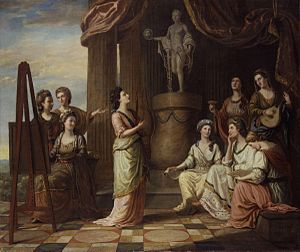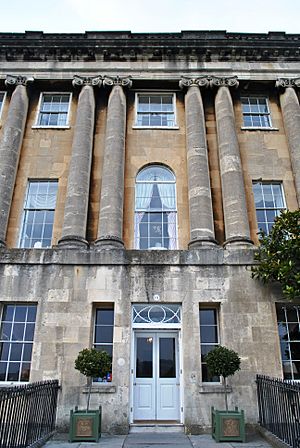Blue Stockings Society facts for kids

The Blue Stockings Society was a special group of women and men in England during the mid-1700s. They met to talk about books, ideas, and learning. It was different from other social gatherings of the time, which often focused on fashion or games. This group believed in education and helping each other learn.
The society was started around the 1750s by Elizabeth Montagu and Elizabeth Vesey, along with others. They wanted to create a place for intellectual discussions, moving away from typical women's activities that didn't involve much thinking. Both men and women were invited. One guest, Benjamin Stillingfleet, a botanist and writer, often came in his everyday blue worsted stockings instead of formal black ones. This was because he didn't have much money for fancy clothes.
The term "bluestocking" came from this group. It described the informal nature of their meetings, where conversation was more important than fancy clothes. By the 1770s, the word "bluestocking" was used to describe any learned woman.
Contents
History of the Blue Stockings

The Blue Stockings Society started around 1750 in England. It became less popular by the end of the 1700s. It was a relaxed group of women who were interested in learning. They met to discuss literature and invited educated men to join them.
Women's Education in the 1700s
The main hosts of these gatherings were Elizabeth Montagu and Elizabeth Vesey. The women in this group usually had more education and fewer children than most Englishwomen of that time. Back then, only men went to universities. Women were expected to learn skills like needlework and knitting. It was often thought "unsuitable" for women to know Greek or Latin. It was even seen as a bit improper for them to be authors.
One member, Anna Laetitia Barbauld, once said that women didn't need colleges. She believed women could learn best from talking with their fathers, brothers, or friends. However, by the early 1800s, ideas about women's education began to change. People started to wonder why a 40-year-old woman should know less than a 12-year-old boy. This change happened as the Blue Stockings' popularity faded.
Advocacy for Women
Many historians say that the Blue Stockings Society helped advance the idea of women's education. They spoke out about the limited roles and lifestyles for women in their society. For example, Elizabeth Montagu wrote in 1743:
In a woman's education little but outward accomplishments is regarded... men are very unwise to try to make fools of those they trust so much with their honor and money. But people often risk their peace to gain power, and they know fools make the best slaves.
This quote shows how some members felt about the lack of proper education for women.
Origin of the Name
The exact origin of the name "Blue Stockings Society" is debated. Some say it came from a fashion trend in the mid-1700s. Black stockings were for formal wear, while blue stockings were for casual, daytime outfits. This would highlight the informal nature of the club's meetings. Blue stockings were also very popular for women in Paris at the time.
Another popular story says the name came from Benjamin Stillingfleet. He was a learned gentleman who didn't have formal clothes for evening parties. Elizabeth Vesey supposedly told him to "come in [his] blue stockings." Stillingfleet became a frequent and well-liked guest at the Blue Stockings Society gatherings. Many sources link Stillingfleet to the blue stocking name.
Purpose of the Society
The Blue Stockings Society did not have formal memberships or fees. They held small to large gatherings where they talked about literature and the arts. Discussions about politics were not allowed. Educated women and invited male guests attended these meetings. The hostesses would serve tea, biscuits, and other light snacks.
A Different Kind of Social Gathering
In 1881, The New York Times wrote about the Blue Stockings Society. It described the group as a women's movement that stood against the popular activity of gambling at high-society parties. Instead of gambling, Mrs. Montagu and her friends, like Mrs. Boscawen and Mrs. Vesey, decided to create a society where conversation would replace card games. They wanted to enjoy intellectual discussions instead of just playing games.
Supporting Each Other
Many of the Blue Stockings women supported each other in their intellectual pursuits. This included reading, creating art, and writing. Many members also published their own books and essays. For example, Elizabeth Carter (1717–1806) was a strong supporter and member of the society. She published essays and poems, and she translated the works of the ancient philosopher Epictetus.
Notable Members
- Anna Laetitia Barbauld
- James Beattie
- Frances Boscawen
- Henrietta Maria Bowdler
- Edmund Burke
- Frances Burney
- Elizabeth Carter
- Margaret Cavendish-Harley, Duchess of Portland
- Hester Chapone
- Mary Delany
- Sarah Fielding
- David Garrick
- Samuel Johnson
- Catharine Macaulay
- Elizabeth Montagu
- Hannah More
- Amelia Opie
- William Pulteney, 1st Earl of Bath
- Clara Reeve
- Sarah Scott
- Sir Joshua Reynolds
- Catherine Talbot
- Hester Thrale
- Elizabeth Vesey
- Horace Walpole, 4th Earl of Orford
- Anna Williams
- Mary Wollstonecraft
Modern Play About the Society
Ladies, a play by Kit Steinkellner, tells a fictional story about four members of the Blue Stockings Society. It explores their influence on modern ideas about women's rights. The play first opened at Boston Court Pasadena in Pasadena, California in June 2019. It was directed by Jessica Kubzansky.
 | Jackie Robinson |
 | Jack Johnson |
 | Althea Gibson |
 | Arthur Ashe |
 | Muhammad Ali |

